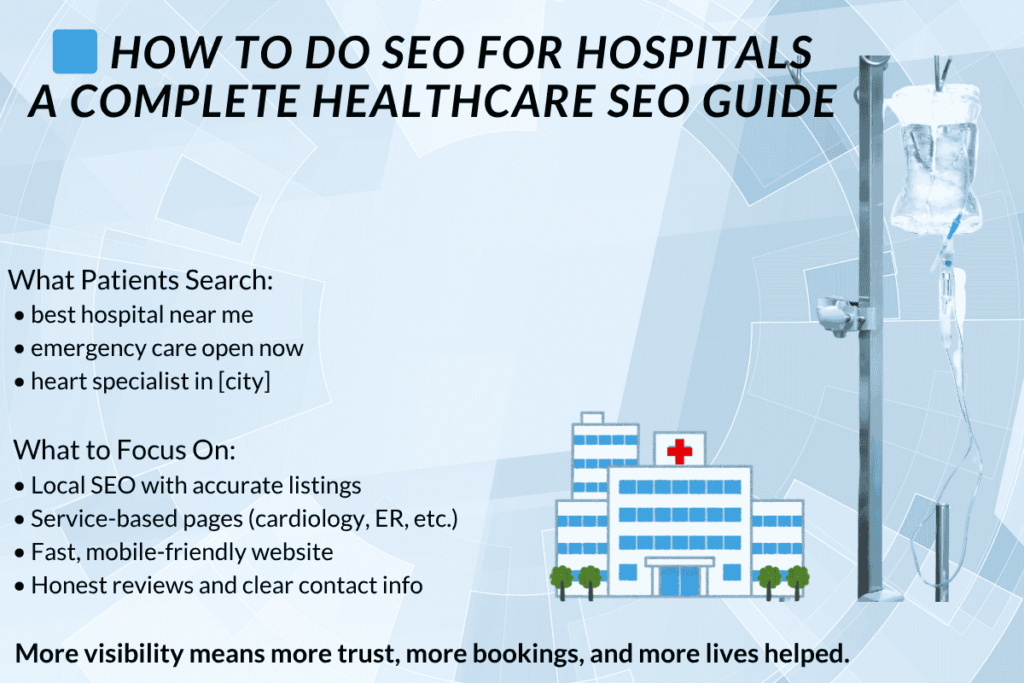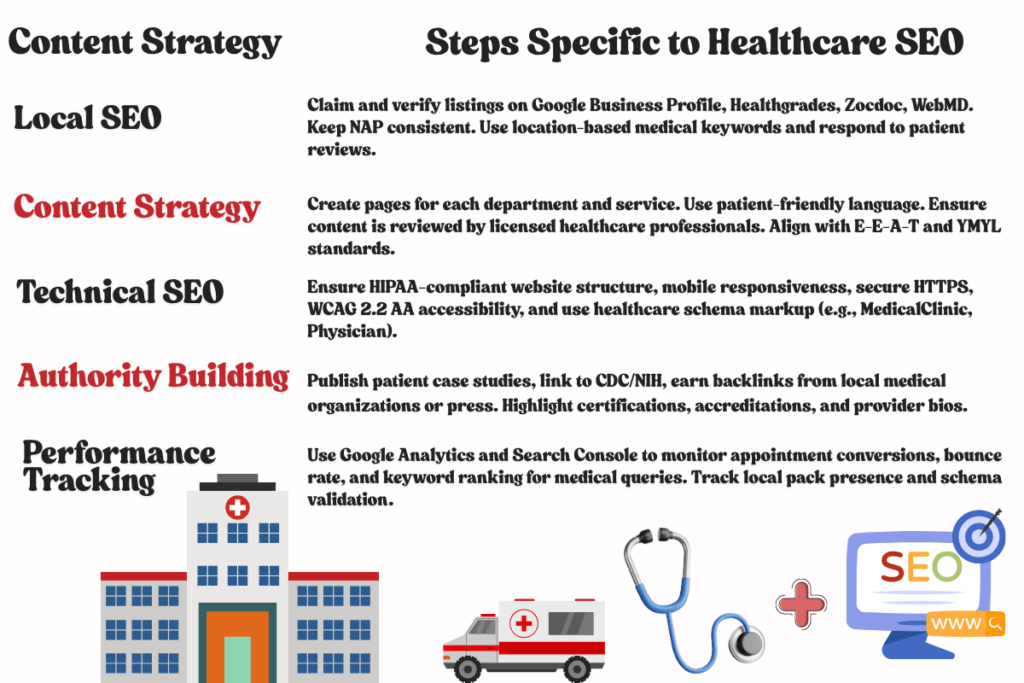Wondering how to do SEO for hospitals? It starts with understanding what patients search for before they ever walk through your doors. More than 70% of patients begin their healthcare journey with a search engine, according to Google Healthcare Insights. If your hospital doesn’t appear in those search results, potential patients may choose a competitor. Even if you offer superior care, they won’t find you if you’re invisible online.
Search engine optimization is a foundational tool for hospitals in the United States. It builds trust, improves local visibility, supports compliance, and increases appointment bookings.
This complete guide outlines how to implement an effective, HIPAA-compliant SEO strategy tailored to the U.S. healthcare system.
Why SEO Matters for Hospitals
According to Pew Research and Google Health Trends:
- 77% of patients research online before booking a provider
- 71% read reviews before making a decision
- 60% of smartphone users contact a provider directly from search results
This shift in behavior shows that search visibility affects more than just traffic. It influences trust, reputation, and revenue. Healthcare websites fall under Google’s “Your Money or Your Life” (YMYL) category. This means content must meet the highest standards of accuracy, trustworthiness, and expertise.
Step 1: Claim and Optimize Local Listings For Your Hospital
Begin by claiming and verifying your Google Business Profile and Bing Places. Make sure your Name, Address, and Phone (NAP) are consistent across:
- Healthgrades
- Zocdoc
- Vitals
- WebMD
- Yelp
Improve your listings by adding:
- Professional photos of your staff and facility
- Updated hours of operation, including holidays
- Appointment links or contact forms
- Clear service descriptions
Encourage reviews and respond to them professionally. This builds trust and improves your ranking in local search results. Keywords play a significant role in reviews; ensure that the people who review it add relevant keywords for the respective hospital. This improves Hospital SEO in local searches.

Step 2: Target the Right Keywords for Hospitals
Patients don’t search using clinical terms like “oncology.” They search for things like “cancer treatment center near me” or “top-rated pediatric hospital in Dallas.”
Use tools such as Google Keyword Planner, Ubersuggest, and Google Search Console to identify:
- Transactional keywords like “book appointment” or “emergency care near me”
- Informational keywords like “symptoms of pneumonia” or “what is outpatient care”
- Location-specific keywords such as “orthopedic clinic in Austin”
Create unique content for:
- Service pages for each department
- Location-based landing pages
- Blog articles that answer common patient questions
If your hospital provides sports injury treatments or orthopedic services, you should also focus on niche strategies. Our article, Tackling Sports Medicine SEO, explains how to attract the right patients through targeted search optimization.
Step 3: Build a Patient-Focused, Expert-Backed Content Strategy
Patients want clear and reliable health information. Avoid medical jargon unless it’s explained. All content should be:
- Written or reviewed by licensed medical professionals
- Accurate and updated regularly
- Designed to answer patient concerns directly
Helpful content examples include:
- What to expect during a colonoscopy
- Recovery timelines for knee replacement surgery
- Vaccine FAQs for parents
Each service page should include:
- An introduction to the hospital or department
- Benefits such as advanced equipment or high success rates
- A clear call to action, like “Schedule a Consultation”
If you’re building a broader keyword strategy or just learning how to approach it effectively, check out A Visual Guide to Keyword Targeting and On-Page SEO.
Step 4: Apply On-Page SEO Best Practices
Use on-page SEO to help search engines understand and rank your pages. Focus on:
- Keyword-optimized titles and URLs
- Meta descriptions with clear benefits (under 160 characters)
- H2 and H3 headers to organize content
- Bullet points and bolded key phrases for better scanning
- Internal links to relevant resources such as:
Step 5: Technical SEO and Compliance
Technical health is vital for patient experience and search rankings. Your hospital website should be:
- Mobile-friendly
- Fast-loading (under 2.5 seconds)
- Secure with HTTPS encryption
- Compliant with WCAG 2.2 AA accessibility standards
- Structured with healthcare-specific schema markup
Use tools like Google PageSpeed Insights, Search Console, and regular audits to catch:
- Crawl errors
- Broken links
- Duplicate content
Step 6: Strengthen Local SEO of The Hospital
For searches like “urgent care near me,” your hospital needs to appear in the map pack.
Steps to improve local SEO:
- Keep your Google Business Profile updated
- Add the hospital to trustworthy health directories
- Embed a map with clickable directions on your website
- Use local keywords such as “OB-GYN in Phoenix”
- Encourage and respond to reviews on all platforms
- Share news about health alerts or community events
To learn how “near me” terms impact search behavior, explore this breakdown on Using Near Me in SEO for Local Business.
Step 7: Build E-E-A-T (Experience, Expertise, Authoritativeness, Trustworthiness)
Google uses E-E-A-T to assess content quality. Healthcare content especially must meet these standards.
To improve E-E-A-T:
- Provide bios of doctors with credentials and experience
- Have content reviewed by board-certified professionals
- Cite authoritative sources like the CDC or NIH
- Showcase trust signals such as HIPAA badges, accreditations, or awards
Step 8: Get Backlinks and Mentions From Reputed Sources
Backlinks from trusted websites boost your authority and rankings.
Ways to earn them:
- Publish research, patient case studies, or hospital reports
- Get featured in local news or medical publications
- Use platforms like HARO (Help A Reporter Out) for media quotes
- Collaborate with bloggers or event sponsors
- Participate in local health drives
Step 9: Monitor SEO Performance of your Hospital
Track your efforts using the right tools:
- Google Analytics for traffic, user behavior, and conversions
- Search Console for keyword data and technical issues
- SEMrush or Ahrefs for backlinks and competitor analysis
Measure:
- Organic traffic growth
- Keyword ranking changes
- Appointment requests or calls from search
- Bounce rates and dwell time
Update outdated pages. Expand successful content. Fix underperforming ones. Need ideas on outreach, citation building, and authority improvement? Start with the 10 Reasons Why Your Hospital Absolutely Needs SEO article.
Step 10: Stay Legally and Ethically Compliant
In healthcare, compliance is non-negotiable. Make sure to:
- Link to a clear privacy policy and terms of service
- Include medical disclaimers on educational content
- Avoid giving specific advice online
- Ensure any data collection follows HIPAA regulations
- Provide accessible content with transcripts, alt text, and proper contrast
Summary Table: Key SEO Tactics for Hospitals

FAQs – Seo for hospitals
Q1: How long does hospital SEO take to show results?
Most hospitals begin to see results in three to six months, depending on competition and site quality.
Q2: Can our internal team handle SEO?
Yes, if they understand healthcare compliance and SEO basics. If not, consider hiring professionals.
Q3: How much does SEO for a hospital cost?
A full strategy typically ranges from $1,000 to $3,000 per month, including content, technical SEO, and tracking.
Q4: How do we prevent misinformation penalties?
Use licensed reviewers, cite credible sources, and update content regularly.
Q5: Is ongoing content creation necessary?
Yes. Regular updates help maintain trust and rankings.
Lets Rank your Hospital
SEO for hospitals is about visibility, trust, and patient care. A well-optimized website helps you connect with your community and offer care when it matters most. Whether you’re a small clinic or a large network, these strategies provide a proven framework for long-term digital success.
If you need help applying these steps, consider partnering with experts who specialize in healthcare SEO.
For personalized support, contact the Abtechx.com team for expert healthcare SEO solutions.
Cited Sources
